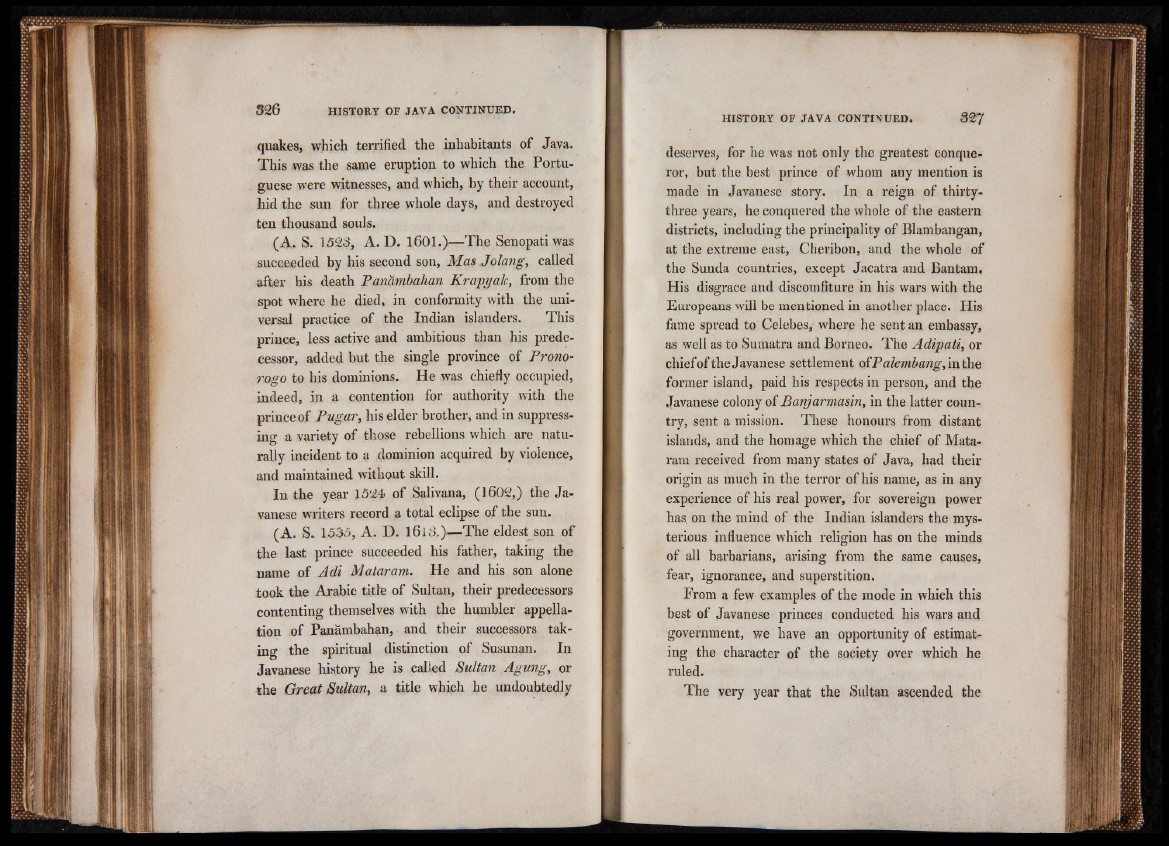
quakes, which terrified the inhabitants of Java.
This was the same eruption to which the Portuguese
were witnesses, and which, by their account,
hid the sun for three whole days, and destroyed
ten thousand souls.
(A. S. 1523, A. D. 1601.)—The Senopatiwas
succeeded by his second son, Mas Jolang, called
after his death Panambahan Krapyak, from the
spot where he died, in conformity with the universal
practice of the Indian islanders. This
prince, less active and ambitious than his predecessor,
added but the single province of Prono-
rogo to his dominions. He was chiefly occupied,
indeed, in a contention for authority with the
prince of Pugar, his elder brother, and in suppressing
a variety of those rebellions which are naturally
incident to a dominion acquired by violence,
and maintained without skill.
In the year 1524 of Salivana, (1602,) the Javanese
writers record a total eclipse of the sun.
(A. S. 1535, A. D. I6l3.)—The eldest son of
the last prince succeeded his father, taking the
name of Adi Mataram. He and his son alone
took the Arabic title of Sultan, their predecessors
contenting themselves with the humbler appellation
of Panambahan, and their successors taking
the spiritual distinction of Susunan. In
Javanese history he is called Sultan Agung, or
the Great Sultan, a title which he undoubtedly
deserves, for he was not only the greatest conqueror,
but the best prince of whom any mention is
made in Javanese story. In a reign of thirty-
three years, he conquered the whole of the eastern
districts, including the principality of Blambangan,
at the extreme east, Cheribon, and the whole of
the Sunda countries, except Jacatra and Bantam,
His disgrace and discomfiture in his wars with the
Europeans will be mentioned in another place. His
fame spread to Celebes, where he sent an embassy,
as well as to Sumatra and Borneo. The Adipati, or
chief of the Javanese settlement oiPalembang, in the
former island, paid his respects in person, and the
Javanese colony of Banjarmasin, in the latter country,
sent a mission. These honours from distant
islands, and the homage which the chief of Mataram
received from many states of Java, had their
origin as much in the terror of his name, as in any
experience of his real power, for sovereign power
has on the mind of the Indian islanders the mysterious
influence which religion has on the minds
of all barbarians, arising from the same causes,
fear, ignorance, and superstition.
From a few examples of the mode in which this
best of Javanese princes conducted his wars and
government, we have an opportunity of estimating
the character of the society over which he
ruled.
The very year that the Sultan ascended the